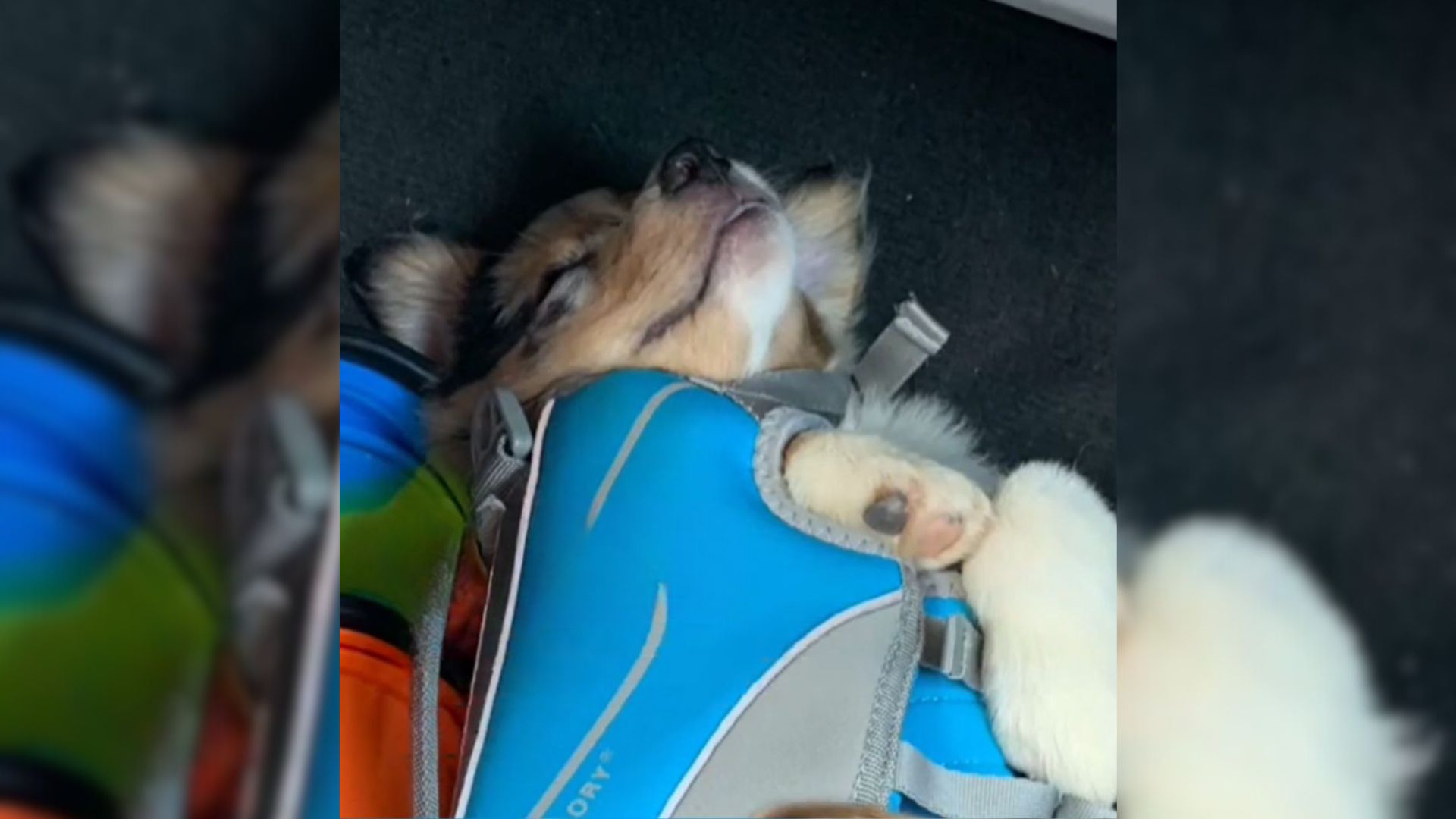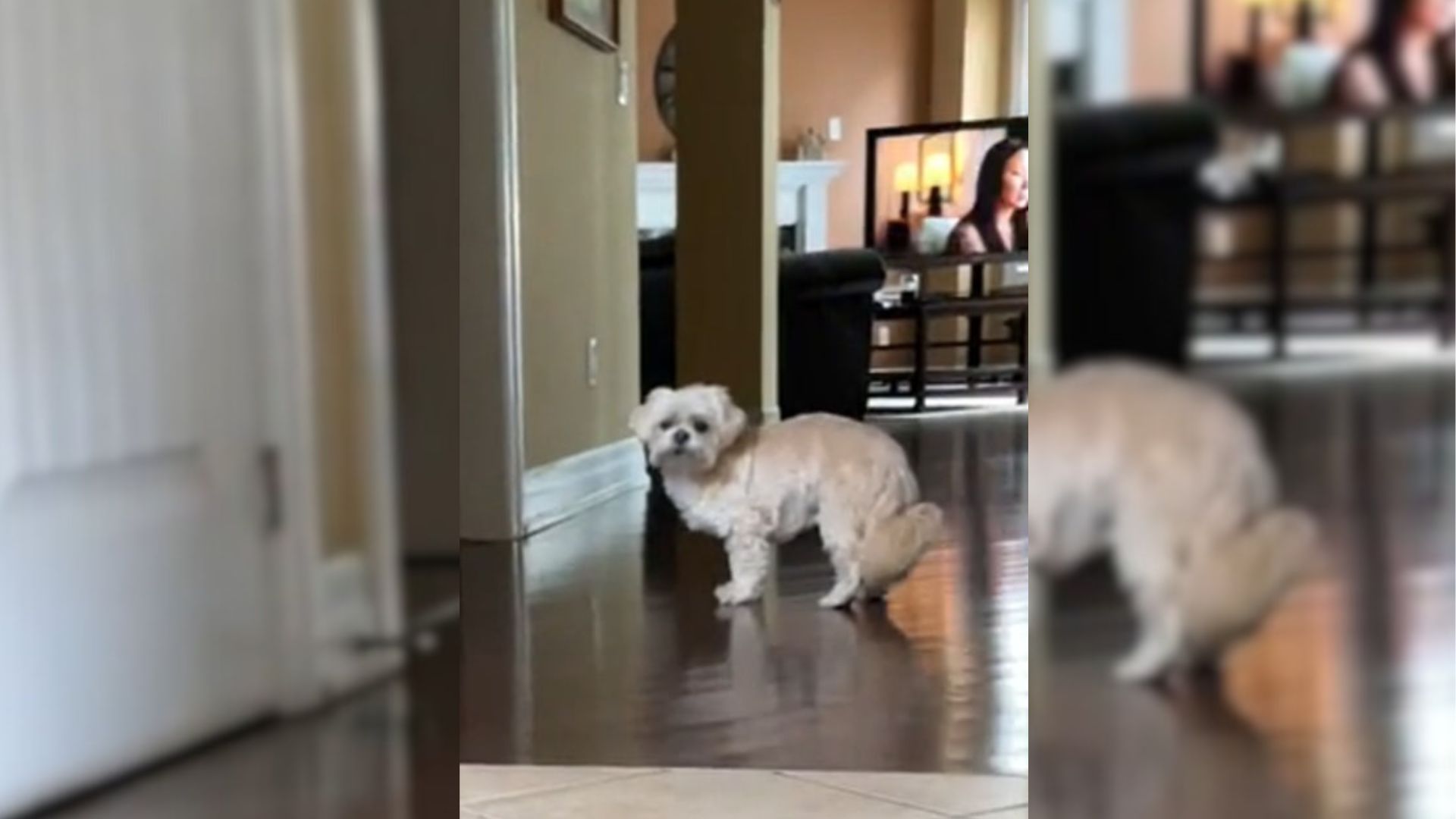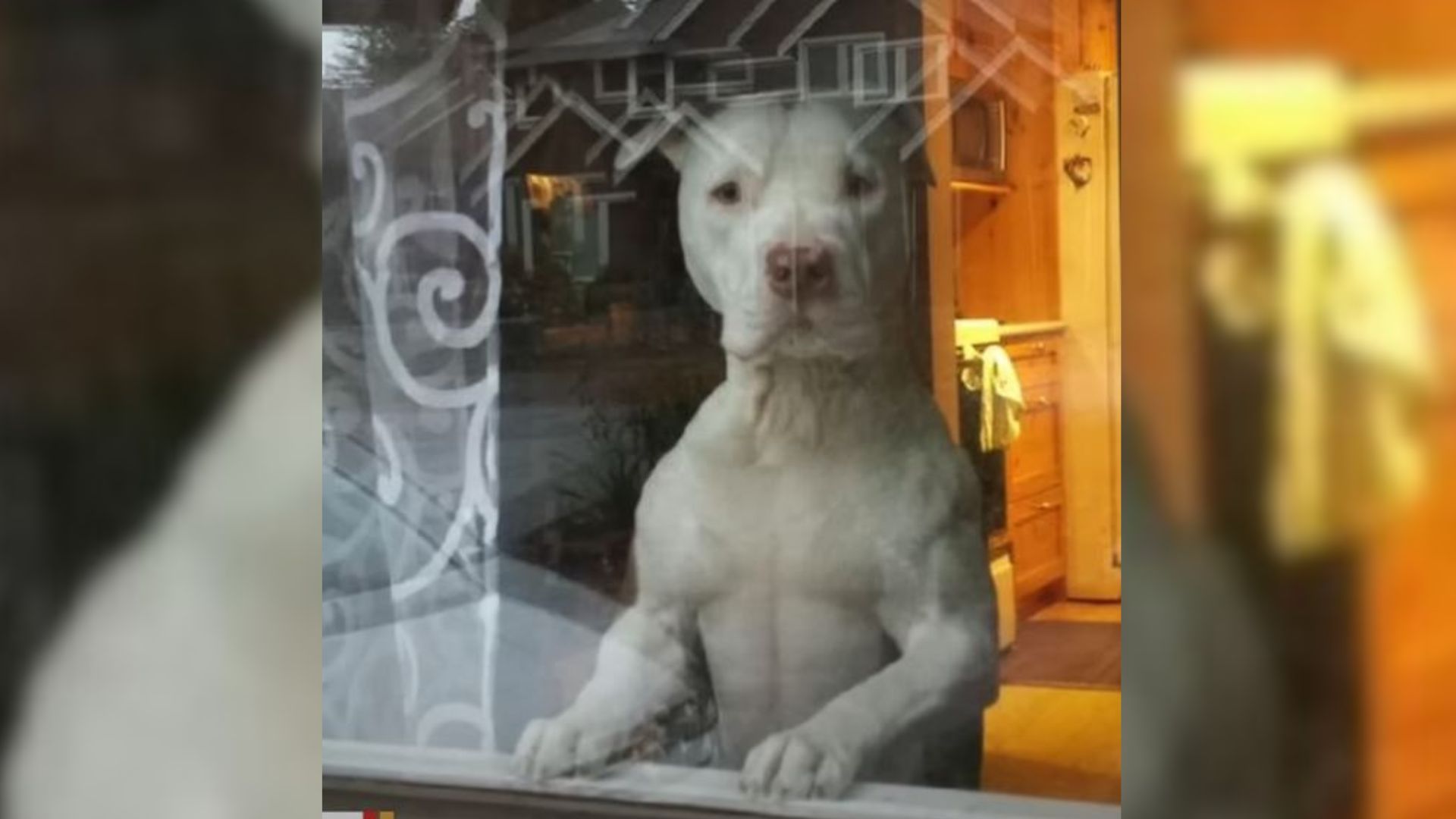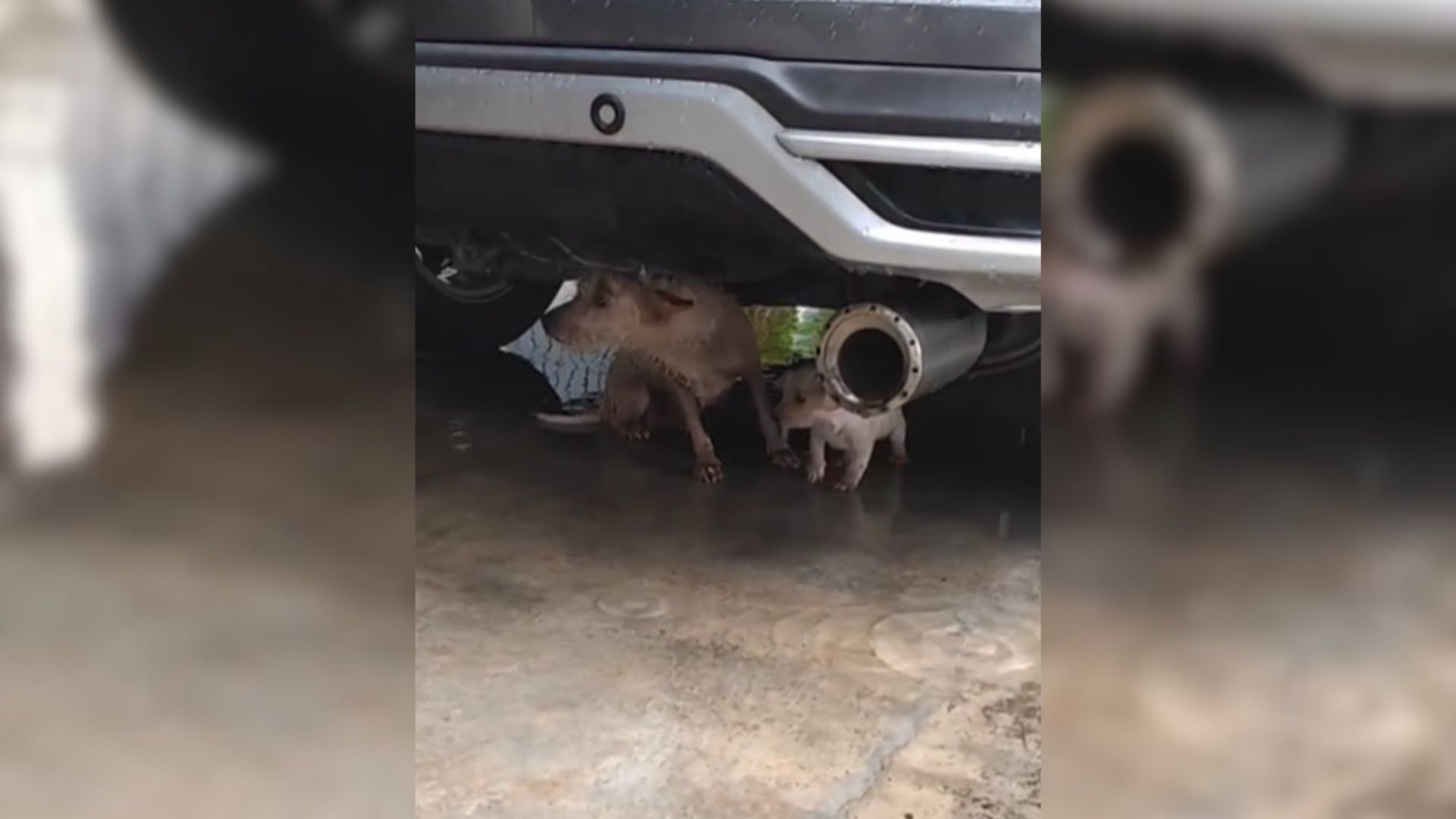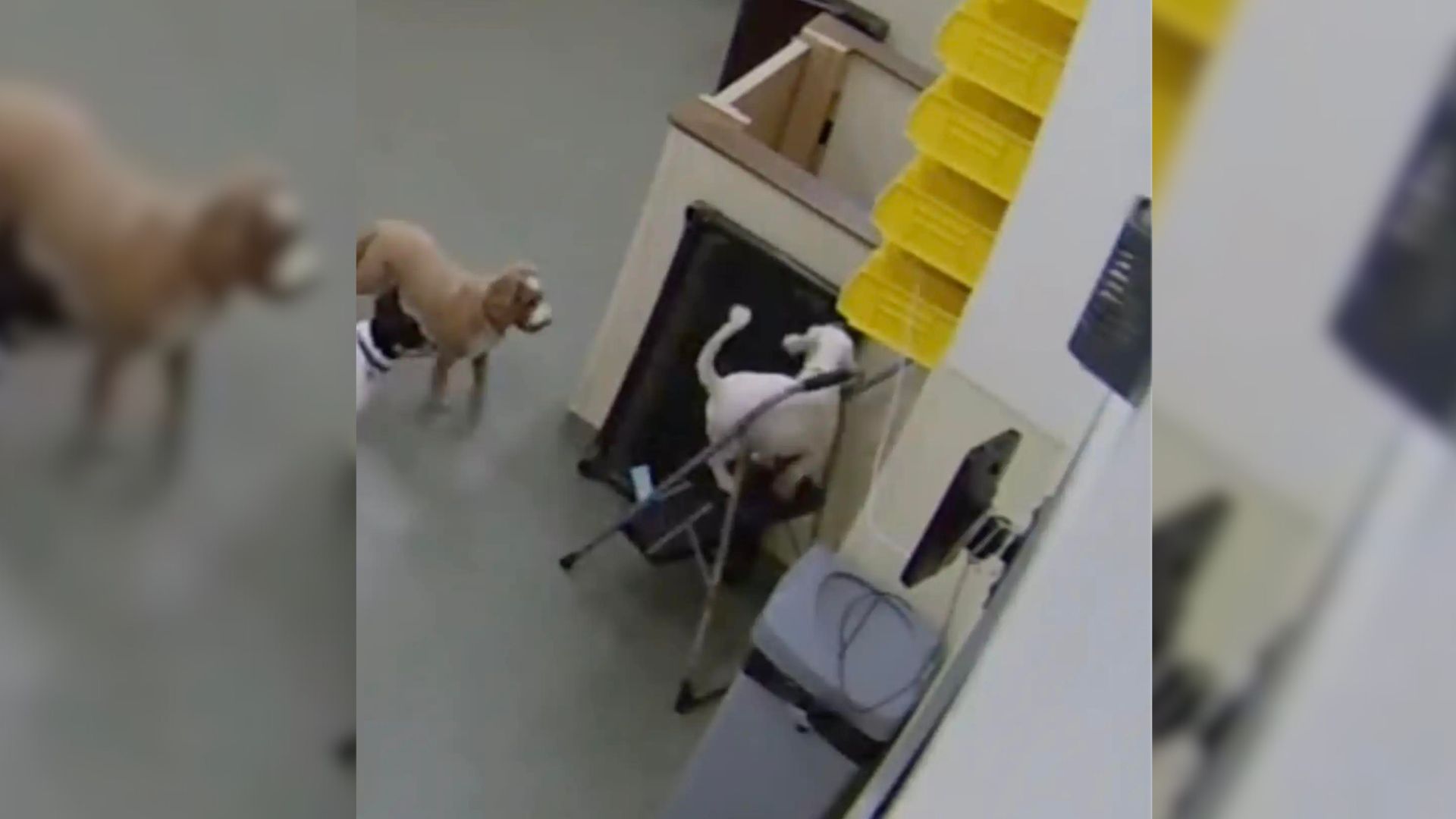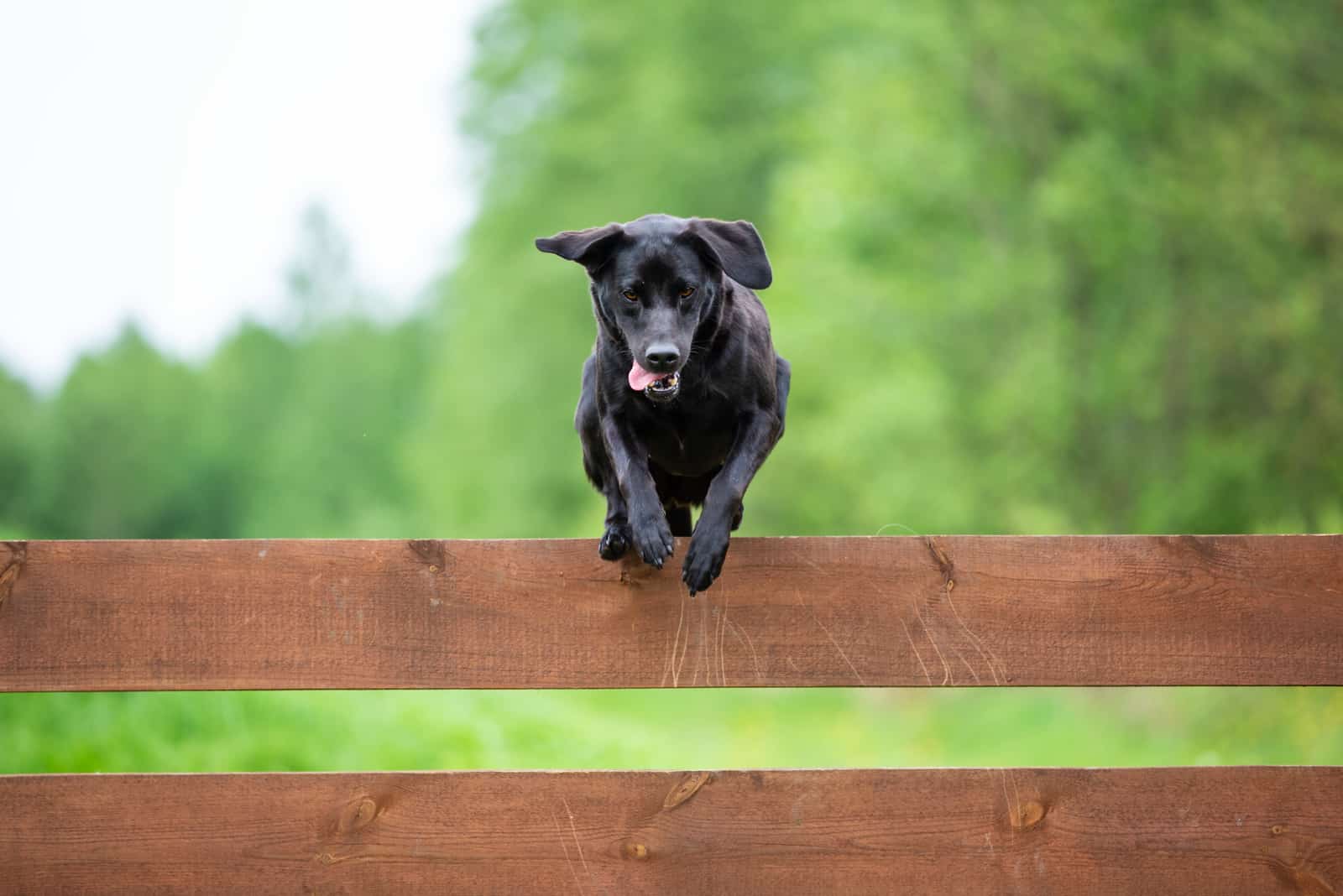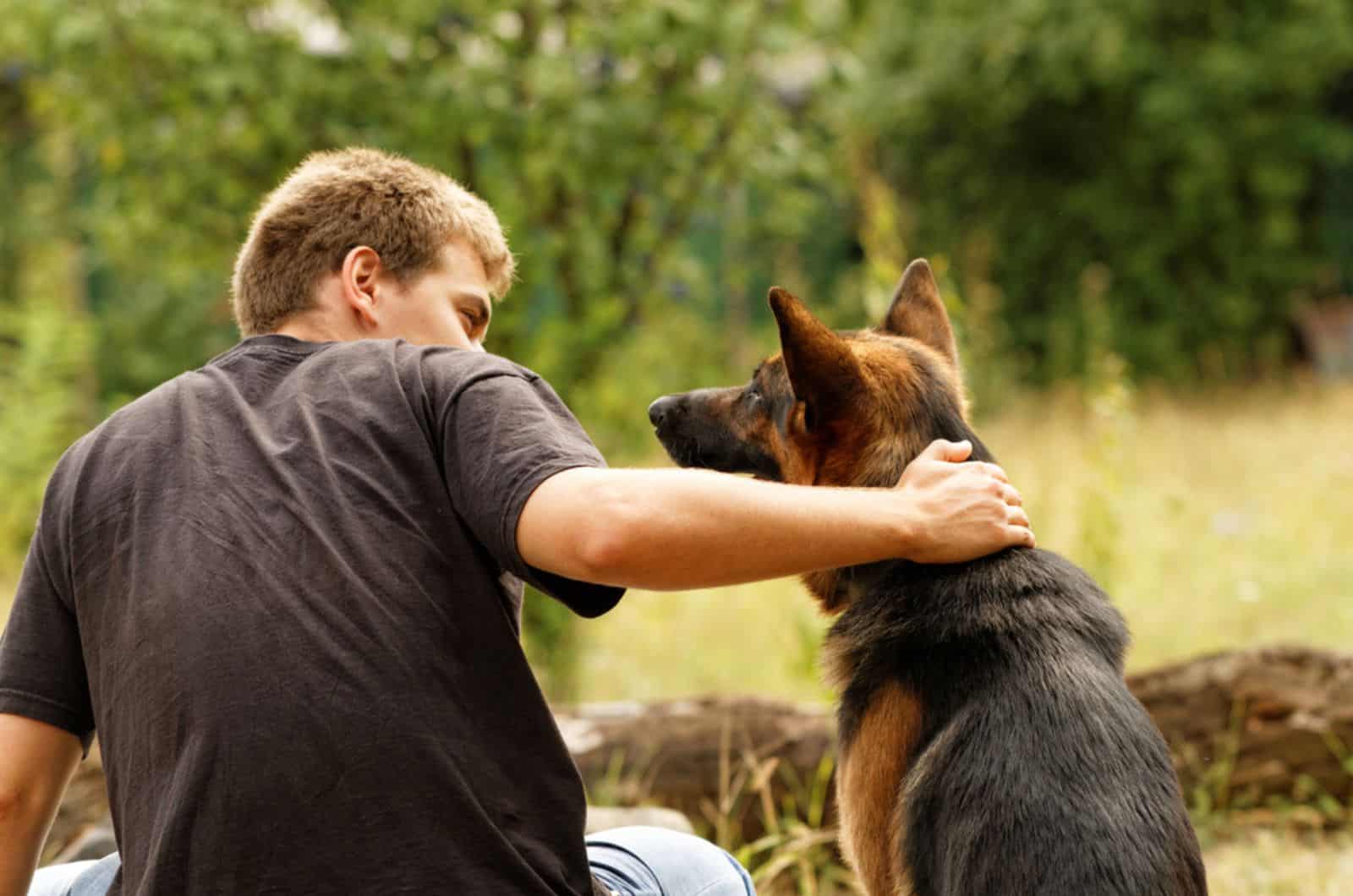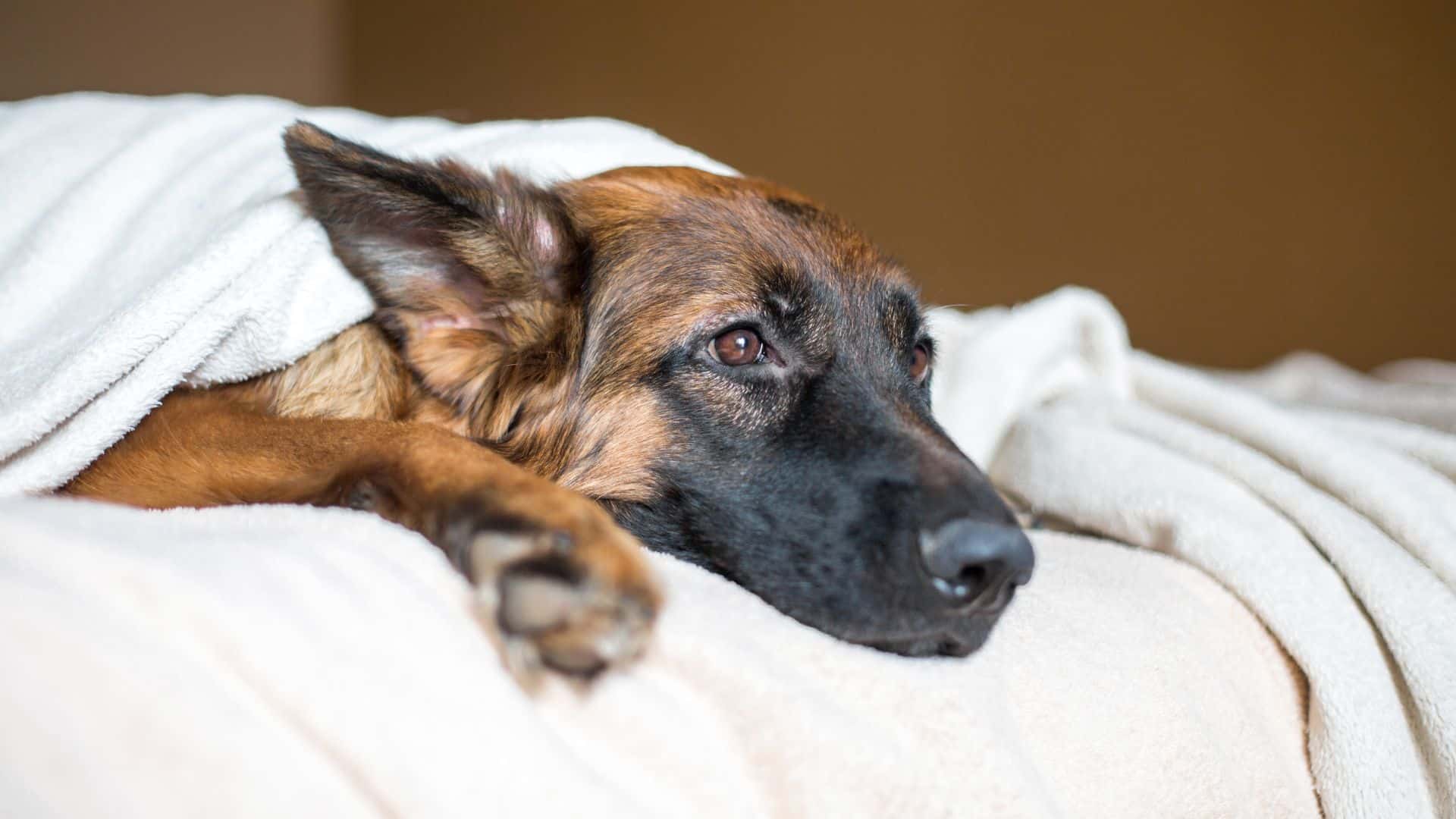The friendly canines known as Rottweilers adore being around people. But, occasionally, they can become overly dependent to the point where you ask yourself: ‘Why is my Rottweiler so clingy?’
Separation anxiety, underlying illnesses, a female’s behavior throughout her heat cycle, just being senior dogs, trauma response, a lack of stimulation, attention-seeking, and learned behavior can all cause Rottweilers to become overly clingy or demanding.
These symptoms might especially show up if you adopted or purchased your Rottweiler during the Covid pandemic, and you got them used to always being around you.
Adult Rottweilers are nothing but mirrors of the way they were brought up during their puppyhood. If they have been beaten, scolded, or raised using any kind of negative techniques, they will most likely end up not having strong bonds with their owners, or worse, being terrified of them.
When you are adopting an adult dog, in this case, a Rottweiler, and you are the first human being who treats him right, there is a big possibility that this adult Rottie will develop separation anxiety when it is not around you.
This sadly is a relatively normal response to this kind of a situation. But, fear not because with mental stimulation and the right positive reinforcement training, even the most severe cases of adopted Rotties can be resolved.
Are Rottweilers Clingy Dogs?
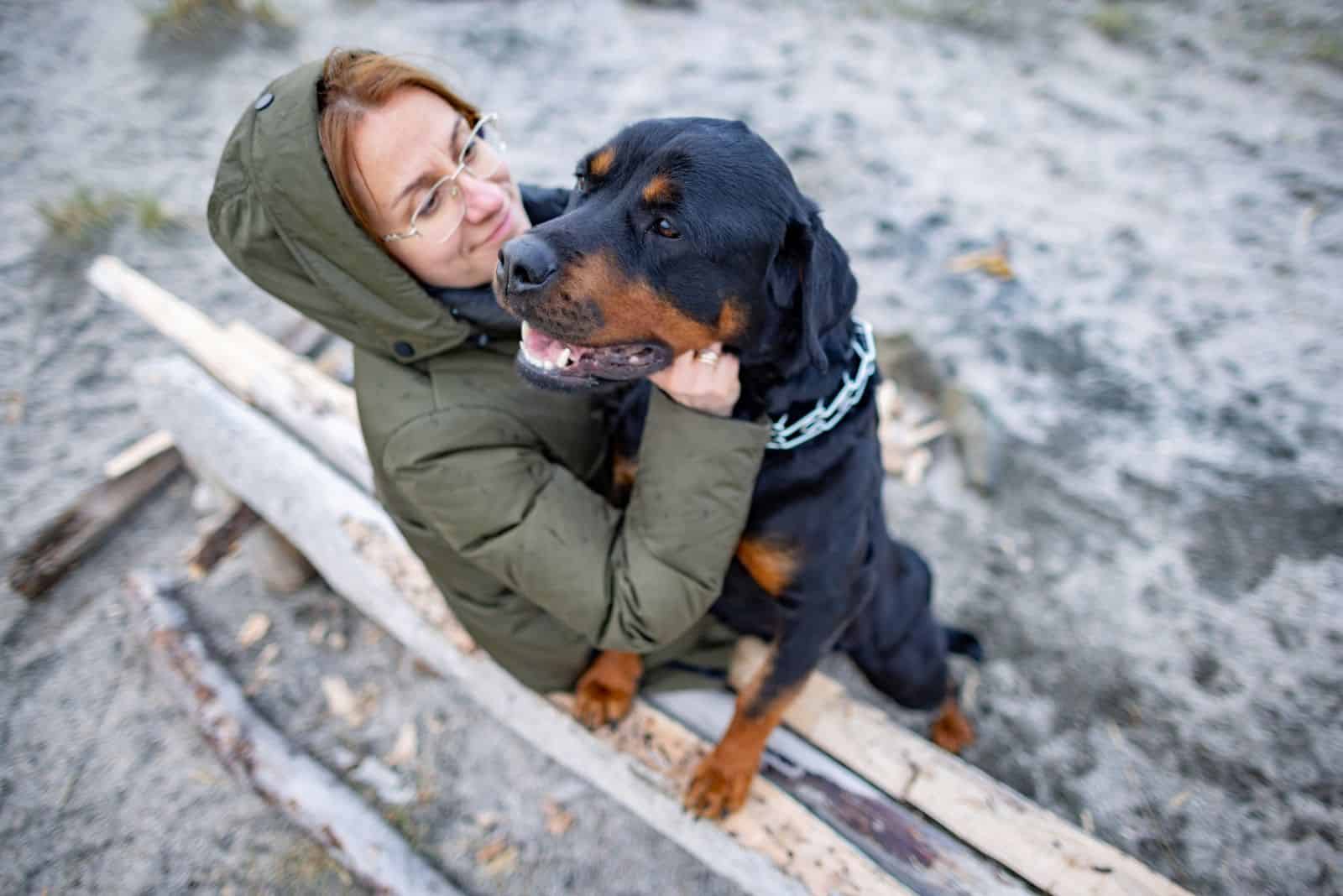
This breed needs to feel like a member of the family. The breed’s personality causes them to frequently form close bonds with their family, and to occasionally be overly attached.
Many people desire this type since they know how to be loyal and affectionate, but not everyone finds this breed appealing.
Yes, Rottweilers are clingy dogs by nature. A Rottweiler is a velcro dog breed, which refers to a breed of dog with a clingy attitude and the need to continuously be around its owner.
Despite the fact that certain dogs can exhibit both clingy behavior and separation anxiety, they should not be confused. Velcro dogs are particularly clingy. In addition to this personality attribute, a Rottweiler may become too attached due to illness or old age.
Although Rottweilers can develop close relationships with every member of their family, they sometimes develop a special attachment to one member. Socialization, focus, favorable associations, and a person’s personality are among the contributing elements.
These strengthen the connection between the Rottie and a family member, leading to the dog’s increased attachment to that person.
Male and female Rottweilers behave differently. The need to constantly be near their owner makes male Rottweilers more prone to being clingy.
Compared to their male counterparts, female Rottweilers are less clingy and more autonomous. Nevertheless, Rottweilers of all sexes are incredibly dedicated to and committed to their master.
1. Separation Anxiety
Do you frequently leave your Rottweiler home alone for extended periods of time? Your dog may then experience separation anxiety. The worst thing you could do to a friendly dog breed like a Rottweiler is to leave them alone for a long period of time.
Many dogs, mainly those whose owners leave them alone at home, suffer from separation anxiety – a frequent behavioral problem. Due to his fear of being left alone, a dog with this disease follows his owner everywhere.
This might be indicated by complaining, acting destructively, or running away. This disorder may worsen, and have a negative impact on the dog’s mental well-being. We advise against keeping your dog home alone for extended periods of time.
When faced with separation anxiety, a Rottweiler tends to cling to or become emotionally connected to its owner.
When they perceive their owners’ separation or departure, they get extremely worried, and when the person returns home, they typically become overexcited.
Due to their people-orientation and need for human company, Rottweilers are particularly prone to separation anxiety. They value being near their human companions and relatives; therefore, this is a good sign.
They frequently experience separation anxiety when they are away from their owner because they feel uneasy. Along with this, the Rottweiler puppy may also pace, complain, or engage in harmful activity like scratching the floor, digging, or defecating inside the home.
2. They Are Guarding You
The ideal breed of guard dog is thought to be the Rottweiler. They have a reputation for being fiercely devoted to their owner and their family.
It’s likely that the Rottie is extremely protective towards you, and wants to keep an eye on you. A few other canine breeds that are territorial and defensive exhibit this behavior.
3. They Love Being Around You
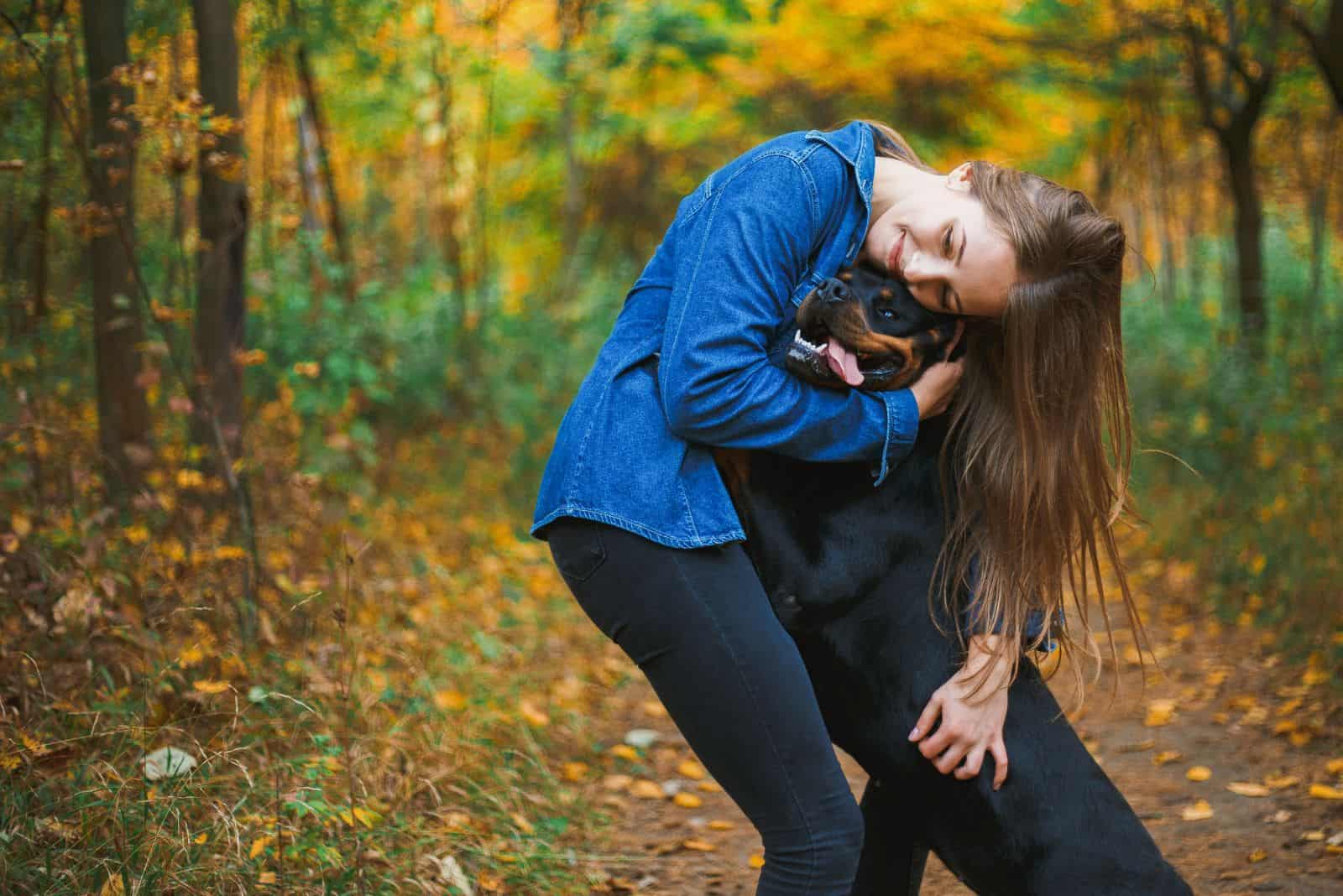
A Rottweiler can indeed be extremely clingy when it wants your attention. When they require our full attention or something from us, dogs make an effort to catch our attention.
You might notice that they follow you around the house, which is their way of expressing their love for you.
In order to catch your attention and persuade you to pay attention to them, Rottweilers will scream, growl, paw, or accompany you around.
4. Their Herding Instinct Is Activated
Herding behavior is the circumstance that causes confusion most frequently. The Rottweiler has a long history of being a herding dog, and this tendency is still heavily present in them now, even though it isn’t as common as it once was.
A Rottweiler might herd children or other animals into particular spaces. They also might nip in some instances to indicate their intended destination.
However, the fact that Rotties are one of the dog breeds that frequently have instincts to herd people can also be perplexing. This may appear to be a friendly Rottie to a casual observer, but the key distinction is that a herding Rottie probably wants you to get somewhere.
Keep an eye out for these actions in your Rottweilers to make sure they don’t develop into habits.
5. Your Female Rottweiler Might Be In Heat
Due to the surge in hormones, a female Rottweiler in heat acts touchy. She has a chance to become pregnant at this point in her cycle.
The duration of this behavior, which frequently occurs throughout the first half of her heat cycle, can reach two weeks. She will accompany you around more frequently than necessary, and need physical interaction; thus, becoming anxious if left unaccompanied.
This clinginess is typical, and not a sign of any medical issue. Additionally, the activity is just transient; once her heat cycle is over, she resumes her regular behavior.
However, it is recommended to speak with a veterinarian to clear any deeper medical concerns if the behavior continues afterwards, when the heat cycle has passed.
6. Past Trauma
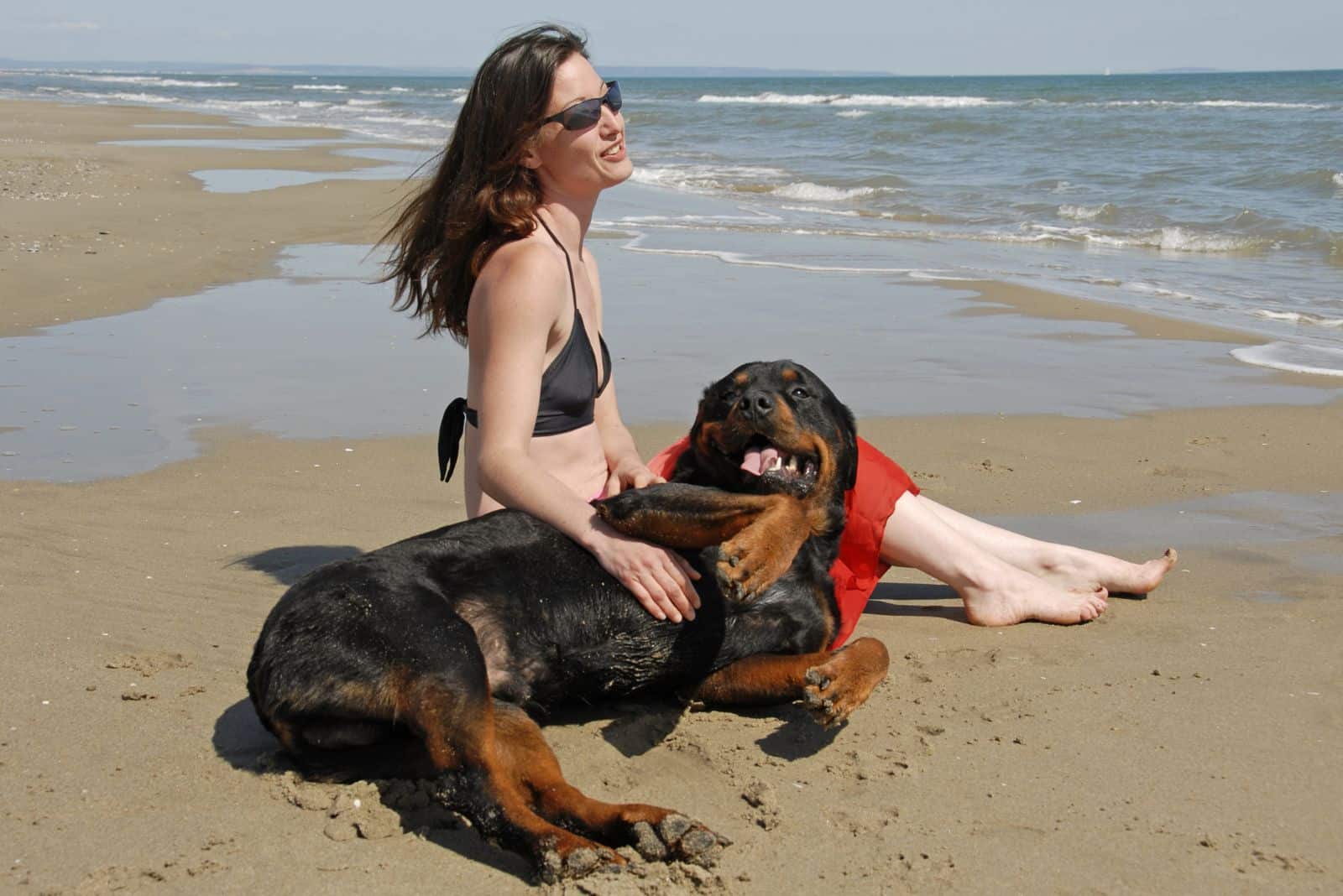
A stressed-out dog will make an unusual amount of effort to cling to you for comfort. Environmental stressors like loud noises, schedule changes, or the surroundings at home can all cause stress.
By noting when the clinginess manifests… that is, if it is brought on by occurrences or circumstances in the house, or your dog’s environment, you can determine stress as the root of the cause.
A Rottweiler may develop clinginess as a result of trauma they have suffered. For example, if you are the second or the third dog owner of your Rottie, you cannot know how the previous owner treated this dog.
It often happens that when someone treats them well for the first time, they just form this strong bond with you, and as a result of that, they will follow you around everywhere and appear clingy.
Signs of clinginess can sometimes result from taught behavior, such as when a Rottweiler is accustomed to sticking close by your side all the time.
This indicates that there is a possibility that by keeping them close to you constantly, and failing to teach them the value of being alone or being separated, you may have unintentionally promoted their behavior.
This also involves having no limitations for when your dog can spend time with you, like on your pillow or in every part of your house, and also giving it unceasing kisses, cuddles, and praise. As a result, your dog grew accustomed to being attached and clingy.
Read more about: Why Is My Dog acting weird all of a sudden?
7. Underlying Health Issues That They Might Have
When ill, a Rottweiler may grow overly attached to you as a means of protection, solace, and assistance. Due to the stress and anguish experienced when avoiding being handled, Rottweilers may exhibit violent behavior.
You might also notice additional symptoms of disease like weakness, or appetite loss or pain if your Rottie is close due to illness.
Keep an eye out for these signs of illness as well as other strange behavior changes in your Rottweiler.
It is not immediately evident why your Rottweiler would be following you around for some psychological or social purpose. He might have had something for you to know. For instance, he might request a walk, a refill of his water bowl, or the opportunity to relieve himself outside.
What Can I Do To Make My Rottweiler Less Clingy?

Consider your Rottweiler’s current circumstances and surroundings in order to determine whether separation anxiety, aging, or stress are to blame for any excessive clinginess.
To be able to identify the potential causes of the clinginess, you can evaluate when the habits began if they have not previously been very clingy, and also how and when the tendency starts.
Knowing the potential reason for your Rottweiler’s clinginess can help you take the necessary corrective action. Don’t worry if you are unable to determine the cause on your own; the next step is to speak with your veterinarian who can assist in identifying the root of the problem.
Practicing leaving and returning frequently will help your Rottie learn that you will return on a regular basis.
They cling to you because they don’t trust you to look after them in the future. When you are their sole caregiver and provider for all of their needs, this may occur.
When there are more individuals residing in the house, it helps to divide up who walks, interacts with, and serves the dog.
1. Lots Of Exercise, Socialization, And Mental Stimulation From A Young Age
Providing this guard dog with plenty of exercises will definitely tire it out. After the dog is tired, it will definitely be less clingy around you.
Other strategies for dealing with clinginess include providing your dog with plenty of activity so that it feels content with your moments spent together, and offering it plenty of activities to keep its mind active, such as puzzle toys.
There are several gadgets that might be helpful in this. These interactive dog toys are a well-liked option; you can stuff them with treats, and your dog will have to work hard to get them out.
Another option is to encourage your Rottweiler puppy to investigate and smell a lot while it is out for walks. Dogs are highly stimulated by smell; consequently, the more they want to investigate, the less dull and anxious they’ll be at home.
Provide your Rottweiler with tasks and exercises to keep him mentally and physically stimulated because bored dogs tend to become clingy. This includes giving your Rottweiler puzzle gadgets, chewing toys, regular walks, and age-appropriate workouts.
Puppyhood experiences and regular exercise have an effect on your dog’s welfare, and they lower the stress levels, according to research.
Attempting to teach a Rottweiler the appropriate habits to reduce clinginess requires behavioral training. This involves instruction in the treatment of trauma or separation anxiety.
2. Spend More Time With Them, And Avoid Praising Clinginess
Clinginess in Rottweilers may also be a learned tendency that you unintentionally encouraged by making them overly dependent on you.
By giving them commands like “stay,” which will stop them from following you around the house, you may stop promoting this behavior. You can also educate your dog on how to be apart from you. For this type of dog, you have to show that you are the pack leader.
Clinginess can be reduced through consistent instruction and positive reinforcement of desired behaviors. Clinginess may simply be your dog’s desire for companionship. This is typical given that Rottweilers are innately sociable, and enjoy being around people.
Your Rottweiler may therefore cry or grow overly attached to you if it feels like it needs your attention.
Set aside time to engage with your Rottweiler, and if his or her clinginess is motivated by a need — for example, a need for walks or assistance leaving the house — provide the assistance.
3. Consult With The Vet Of Your Choice
Discuss the reasons why your Rottweiler is clingy and the necessity for attachment with your veterinarian.
The veterinarian will decide if the issue is either brought on by an underlying ailment or a behavioral problem that requires treatment by a pet behaviorist.
Following this evaluation, the vet will either suggest a course of action or a licensed animal behaviorist to assist with your Rottweiler’s training.
Advice On Clingy Rotties
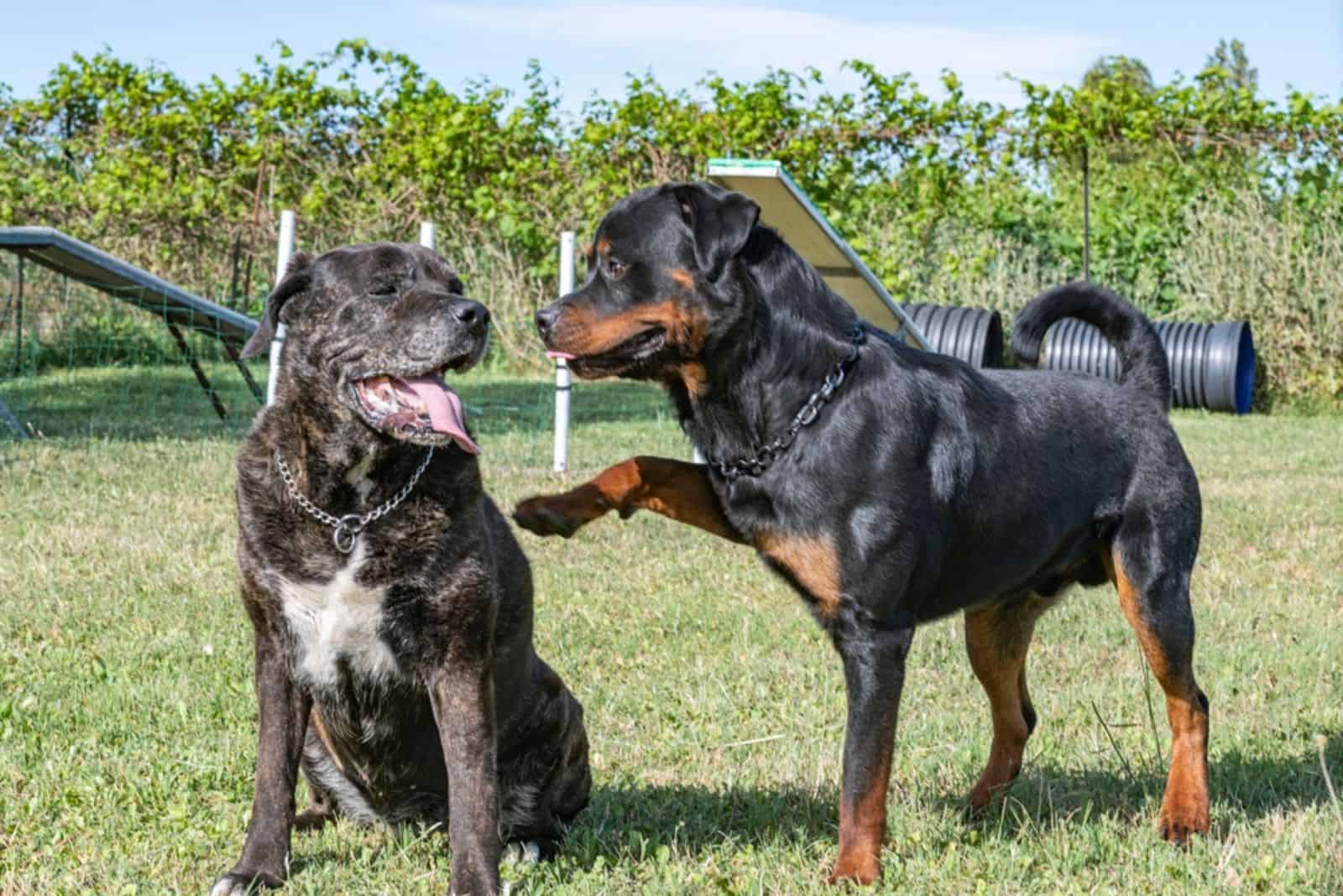
- Find things to do to keep your Rottweiler busy while you’re away. Boredom may be the reason for the concern, ‘why is my Rottweiler so clingy!’ Provide them with puzzle toys and perhaps other pastimes, for instance.
- A good one is to let your dog spend some time away from you so that it may learn how to pass the time on its own. This can be done by having meet-ups with some other dogs, spending time with certain other members of the family, or simply staying in its box.
- Consider getting a second pet to play with if the Rottie is really struggling to keep busy. Dogs require companionship because they are social animals. Along with their owner, it will provide them with other outlets for their energy.
- If you know you’ll be gone for a while, you can play games, go on walks, and do other activities with your Rottweiler to pass the time. This will stop the dog from cobbing, and wear him out.
Final Word
There are many possible reasons why, and many answers to the question, ‘why is my Rottweiler so clingy’, that we have covered.
It’s nothing to worry about if your dog becomes overly attached; in fact, we always find our Rottweiler’s antics adorable.If your dog simply follows you, and doesn’t interact with any other member of the family or a friend, then you should consider your dog’s conduct.
This implies that your Rottweiler requires more socialization, and needs to feel secure around other family members.

